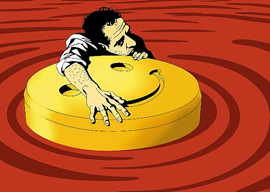
April 19, 2012

There is a story, very likely apocryphal, that shortly after Charles de Gaulle resigned France’s presidency, he and his famously prim wife were entertaining some American guests at their country house. Not all the guests knew French, so conversation was somewhat of a struggle. De Gaulle knew English well, though he rarely spoke it; his wife’s English was rudimentary.
Trying to keep the ball in play, at one point a guest asked Mme. de Gaulle in English what she hoped for most from life now that her husband had no official duties. After a pause for thought, the lady replied: “A penis!”
There was an awkward silence during which the guests all stared hard at their dessert plates. Then de Gaulle leaned forward to his wife and said:
“Non, non, my dear. In English it eez pronounced ““appiness.””
Who does not want to be happy? Is not the pursuit of happiness one of those inalienable rights the Declaration declares us to have been endowed with by our Creator? Did not an eminent philosopher seek the greatest happiness for the greatest number? Does not a presidential candidate thrill to hear himself called “the happy warrior”?
Economists and social scientists now have their hands on happiness. They are weighing and measuring it and putting it into their spreadsheets. There is a Journal of Happiness Studies, now in its 13th year. Sample paper: “The Role of Hope, Spirituality and Religious Practice in Adolescents” Life Satisfaction.” Derek Bok, former president of Harvard University, has a new book out: The Politics of Happiness: What Government Can Learn from the New Research on Well-Being. There have been two news stories out of Happiness Studies this past couple of weeks.
First story: A survey in Britain reveals that 33 is the age of maximum happiness. “By this age,” says one of the participating psychologists, “innocence has been lost, but our sense of reality is mixed with a strong sense of hope, a “can do” spirit, and a healthy belief in our own talents and abilities.”
Second story: Three economists working for the United Nations have issued a report on happiness worldwide. Denmark is the happiest nation, according to them. Presumably the current pinnacle of happiness is to be a 33-year-old Dane. Runner-up nations on the GNH (Gross National Happiness) Index: Finland, Norway, Netherlands, Canada, Switzerland, Sweden, New Zealand, Australia, Ireland, and the USA.
I don”t believe a word of it. All those tidy, socialized, overtaxed, single-payer-healthcare, conformist Scandinavians and Anglo-Celts are happier than Uncle Sam’s rambunctious nephews? They may be more contented in their smug, socially secure, unadventurous ways, but surely that’s not the same thing.
I believe what we have here is what another philosopher called “misplaced concreteness.” Happiness is much too slippery a notion to stay put on a spreadsheet.
King Croesus learned that when he tried to get the sage Solon to tell him he was the happiest of men. Solon applied a very strict standard:
The fortunate man…has no injury, no sickness, no painful experiences; what he does have is good children and good looks. Now if, in addition to all these things, he ends his life well, too, then this is the man you are looking for; he alone deserves to be called happy and prosperous. But before he dies, refrain from calling him this”one should rather call him lucky.